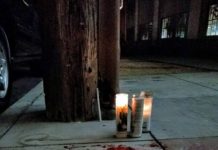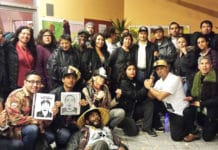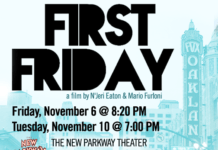A struggle for decolonization and justice for all of us
by Lisa ‘Tiny’ Gray-Garcia, daughter of Dee, mama of Tiburcio and co-founder of POOR Magazine

“Even an animal doesn’t deserve to die the way they killed my husband,” said Dona Fedelia del Carmen, widow of Luis Demetrio Gongora Pat, a Mayan indigenous man killed by San Francisco police April 7, 2016, for doing nothing. For doing nothing, except being Brown and unhoused in a city plagued by the disease of capitalism and its sister illness, gentrification.
“I am demanding justice and honor for my husband,” she concluded to a barrage of Mexican cameras and reporters in an international press conference in the city of Merida, Yucatan, the land of Luis’s family and extended family.
The family stood together, wearing their traditional Mayan dresses – mamas, aunties, daughters, uncles, brothers and sons – in a sterile hotel conference room in Merida, their love creating a space that wasn’t there. Together, they were peaceful warriors for justice. Tears flowed from their collective eyes for the brother, son, father and uncle they had lost behind the violence and dangerous racism of the colonizer borders, littered with our bodies.
Indigenous peoples crossing colonial constructed borders in search of basic livelihoods, jobs, safety, food and all that was stolen from them by corporations, colonization and politricksters are in a state of constant danger. They are forced into this brutal diaspora, leaving behind love, land, children, families, spouses, traditions, languages, friends, spirits and ancestors.
Leaving all you know and all you are in a tortured journey seeping with capitalist hate, racism, separation and confusion, only to be consumed by a society that doesn’t know you, care about your heart or your scholarship, traditions, languages or families. They only care about how much work you can perform for them, rent you can pay them, or service you can provide them. This is a colonizer defined world and it kills us all somehow.
My 13-year-old son, Tiburcio (who is Mayan, Aztec and Chinese on his father’s side) and I had the blessing of being in the room with these warriors along with revolutionary lawyer Adante Pointer from the John Burris law firm, who is representing the family in their case for justice against the SF police. Together with Justice and Honor for Luis organizer Adriana Camarena and her husband, Chris Carlsson, historian and writer, we all traveled to Teabo, Yucatan, the birthplace of Luis, in October of 2016 to deliver a quilt created by the Justice and Honor for Luis Coalition in Yelamu (San Francisco) and hold an international press conference for justice for the family.
“Even an animal doesn’t deserve to die the way they killed my husband,” said Dona Fedelia del Carmen, widow of Luis Demetrio Gongora Pat, a Mayan indigenous man killed by San Francisco police April 7, 2016, for doing nothing.
“In talking to the witnesses and looking at the physical evidence and surveillance camera footage which was taken directly across the street from where Mr. Gongora was shot, we know that what happened on April 7, 2016, was wrong. My law firm filed a lawsuit, a federal lawsuit against the San Francisco city as well as the two police officers that robbed this family of their loved one,” said Adante Pointer.
Adante spoke while showing terrifying images on the big screen of the body and head of Luis, whose head was literally shot off by the police attack. “This is the way it happened: Two police cars come to the scene. And then a third one pulls up.
“The officer in the first car gets out. He (inaudible) has a shotgun in his hand. And within seconds he starts firing the shotgun, as if he was firing (at) an animal in the wild. You saw a lady who was walking by as the officer started firing their gun.
“What you can tell from the video is that Mr. Gongora is never seen running at the officers, but what you see are the officers pointing their guns in a downward direction and they fire a number of shots with their guns pointed down at the ground. Down at the ground, meaning, the target they were firing their guns at, who was Mr. Gongora, was not standing up.
“He was not coming at them but instead was either on the ground or going to the ground – meaning that he was not a threat to anyone, to the officers themselves or anyone else who was out there.”
Poor People traveling for justice for poor people
I still was confused on how I, a very low-income, formerly unhoused single mother who, like my co-madre jewnbug says didn’t even have “documents” in my own so-called stolen land, would be able to go to Teabo.
The journey to Luis’s homelands in Central Turtle Island (Southern Mexico) between colonization and our liberation began in one of the pinnacles of capitalism – the ultimate example of displacement, gentrification and post-colonial destruction – the Ohlone village of Yelamu (San Francisco), stolen by the lie of discovery, sadistic colonizers and their enabling missionaries and where Tiburcio and I and other poor mamas and children used to live but were evicted out of and are no longer able to even come back.
Luis’s gravesite in Teabo
“This is where Luis is buried, “ Adriana explained to me as we stood quietly with the family as they cleaned and laid down fresh flowers on Luis grave in Teabo. Little multi-colored castles, lined up next to each other in a series of tiny streets. We huddled under an awning of a larger “house” holding a family’s gravestones. These families, many of whom lost multiple members to the other side of the borders, were held.

The indigenous lands of Luis were beyond an idyllic postcard or travelogue, but rather a place of indigenous resistance where the panaderia cooked their pan dulce in a clay oven with fire rather than use the electrical oven that lay under plastic over in the corner, unused. A place where straw bale homes were still the primary form of building, a place where brick and mortar homes paid by remittances from across the border often stood vacant, a tribute to the violence of capitalism.
The village of Teabo, on one hand, would be considered poverty-stricken from a greed-fueled capitalist lens because it has no jobs, no industry, no banks, no supermarkets and no freeways, and yet from the perspective of many of the elders I spoke with it had everything needed for a people to thrive. “These plants make soap,” said one of the young family members, Viki, as she stood on her family’s land pointing out the many plants growing there that provided them with medicine, tools and cleaning supplies.
She went on to show us a well, a small farm of animals for meat and the pure science of the hammock, the efficient, comfortable and cool form of bedding used by everyone in the town.
“People think we are rich here, just because we have family on the other side,” said Dona Carmen, widow of Luis, as she stood in her kitchen in Teabo. As we sat together eating the beautiful meal they prepared specially for us, their guests, us poverty skolaz from stolen Turtle Island compared notes with their family about the lies from both sides of the borders. She went on to explain that many people think wrongly about the families that cross, that they are “better off” than the families that stay.
I was reminded of one of my ghetto skola Mama Dee’s required movies she assigns to students in POOR Magazine’s PeopleSkool, “Hoop Dreams,” which looks at two basketball players from the hood, one who stays in town with family and community and another who takes the corporate sports pimp-deal offered by a famous university. Out of the two examples, the young man who stayed close to his mama and family and people actually ended up doing better than the pimped corporate son.
Family in Yelamu (SF) one year later

“We want to show the brutality and racism of the SF police, we want to show the truth about the connection between eviction and houselessness and police murder, about the terror of police terror, and look at what a sanctuary city like San Francisco should even mean,” said Luis Poot Pat, cousin of Luis Demetrio Gongora Pat. He was speaking about a grand march for justice they are planning for April 7 and hope the whole city will join.
The family of Luis who are on this side of the colonizer borders are cousins, nieces, nephews and a brother, who, like over 70,000 other Mayan indigenous people living in San Francisco, work hard at different forms of hard labor employment, many staffing the kitchens and restaurants of San Francisco, cleaning your dishes, your floors, your houses. Most of the restaurants would be forced to close if they lost these Mayan leaders.
One year later they still seek justice and are asking the city of SF to see this moment as a moment of pan indigenous prayer, of decolonization, of art, theatre, dance and rhythm, of intersectionality between workers, unhoused peoples, tenants, police terrorized, disabled, immigrants/migrants, Mayan, First Nations and indigenous peoples’ rights.
To realize that in so many ways Luis was a tragic symbol of everything we conscious peoples all fight for every day, we all wish to see justice and we all need to manifest in these terrifying times where we are all under attack. That this day, this march, is connectivity under the struggle for Luis, a march of decolonization and justice for all of us.
The family asks everyone to join the march on Friday, April 7, which will begin at 10 a.m. at the corner of 19th and Shotwell, the location of the murder of Luis by SFPD. For more information on Luis’s case, go to https://justice4luis.org/ or look on Facebook for Justice for Luis Demetrio Gongora Pat.
Tiny – or Lisa Gray-Garcia – is co-founder with her Mama Dee and co-editor of POOR Magazine and its many projects and author of “Criminal of Poverty: Growing Up Homeless in America,” published by City Lights. She can be reached at deeandtiny@poormagazine.org. Visit POOR at www.poormagazine.org.

 Store
Store











